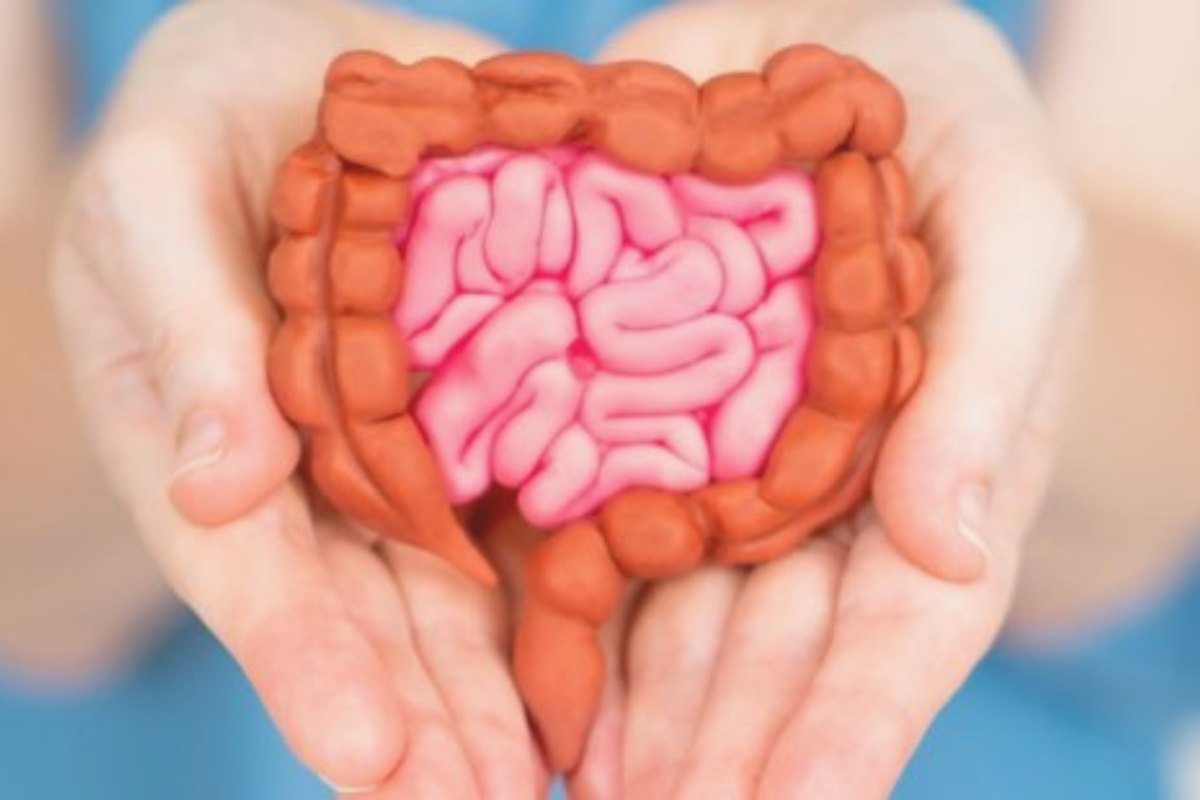The Mind-Gut Connection: Mental Health and Your Microbiome

KEY TAKEAWAYS
- The gut-brain connection plays a critical role in mood regulation, stress management, and cognitive performance through a network of nerves, hormones, and neurotransmitters.
- A balanced gut microbiome supports mental health by producing neurotransmitters like serotonin and dopamine, regulating inflammation, and maintaining emotional resilience.
- High-fiber diets, fermented foods, and prebiotic-rich ingredients are essential for gut health, which in turn promotes better mental well-being.
- Chronic stress disrupts the gut-brain axis, but stress management strategies like mindfulness and exercise can restore balance.
- Probiotic and prebiotic supplements offer targeted support for gut health, aiding in the reduction of symptoms related to anxiety, depression, and brain fog.

Your gut health deeply influences your mental health, and the connection between the two is a fascinating field of science. Known as the gut-brain axis, this bidirectional communication system highlights how the gut microbiome—the ecosystem of trillions of microorganisms living in your digestive system—affects your brain and emotional well-being. Understanding this relationship is key to unlocking better ways to manage stress, anxiety, and overall mental health.
A healthy gut can significantly enhance mental resilience, cognitive function, and emotional stability. On the other hand, an imbalanced gut, or dysbiosis, can contribute to conditions such as depression and anxiety. As research grows, it’s clear that nurturing your gut health is an essential part of maintaining a balanced and healthy mind. This guide dives into the science and practical steps you can take to foster a healthier gut and, in turn, support your mental well-being.
Understanding the Gut-Brain Connection

The gut-brain connection is a sophisticated communication network that links your digestive system and brain. This relationship is maintained through intricate interactions involving the central nervous system, the enteric nervous system (ENS), the vagus nerve, and a variety of biochemical signals such as hormones and neurotransmitters. Together, these systems create a dynamic two-way communication pathway that allows your gut and brain to constantly exchange information. This means that the state of your gut can directly influence your mental and emotional well-being, just as your mental state can impact the health and functionality of your gut.
When this communication system is functioning optimally, it helps regulate essential bodily processes, including digestion, stress responses, and emotional balance. However, disruptions in this delicate system can lead to imbalances that affect both physical and mental health. Understanding how this connection works is the first step in harnessing its potential to improve your overall well-being.
“Your gut produces 90% of the body’s serotonin, making it a key player in your emotional and cognitive well-being.”
How the Gut Communicates with the Brain
The Vagus Nerve
The vagus nerve serves as the primary communication pathway between the brain and gut. This powerful nerve transmits signals that regulate hunger, digestion, and even the body’s response to stress. It acts as a feedback loop, ensuring that the brain is constantly updated on the gut’s status. For example, when the gut is under stress—whether due to poor diet, inflammation, or illness—the vagus nerve sends distress signals to the brain, which can manifest as anxiety or low mood. Conversely, the vagus nerve can also carry calming signals from the brain to the gut, helping to regulate digestion and reduce inflammation. This critical nerve plays a pivotal role in maintaining not just physical health, but also mood stability and emotional resilience.
Neurotransmitter Production
Your gut is a powerhouse for producing essential neurotransmitters, which are the chemical messengers that regulate mood, cognition, and sleep. The gut microbiome—the ecosystem of bacteria, fungi, and other microorganisms in your digestive system—produces about 90% of the body’s serotonin, often referred to as the “happiness hormone.” In addition to serotonin, the gut also produces dopamine, which is critical for motivation and focus, and gamma-aminobutyric acid (GABA), which helps regulate anxiety and stress levels. When your gut is healthy, it supports the production and proper functioning of these neurotransmitters, creating a positive ripple effect on mental health.
The Microbiome’s Role
The gut microbiome plays an integral role in this communication system by interacting with the ENS and influencing brain behavior. Beneficial bacteria in the microbiome produce metabolites that affect the brain’s stress response, emotional regulation, and even cognitive functions. When the microbiome is balanced and diverse, it fosters a positive environment for both gut and brain health. However, an imbalanced microbiome—known as dysbiosis—can disrupt these processes, leading to heightened stress responses, mood disorders, and cognitive difficulties.
The Significance of the Gut-Brain Connection
The importance of this relationship becomes increasingly evident when you consider how stress or anxiety can manifest as digestive issues, such as an upset stomach or irritable bowel symptoms. Conversely, an unhealthy gut can contribute to emotional challenges, including heightened feelings of sadness, tension, or irritability. For example, chronic gut inflammation or poor microbiome health can amplify stress responses, creating a cycle of physical and emotional discomfort.
Addressing this bidirectional relationship offers a powerful opportunity to improve both mental and physical health. Strategies that nurture a healthy gut—such as a balanced diet, stress management, and incorporating probiotics—can lead to transformative improvements in mood, cognition, and overall well-being. Understanding the gut-brain connection is not just about recognizing its impact but also about taking actionable steps to harmonize the body and mind.
The Microbiome and Mental Health

Your gut microbiome is a bustling ecosystem of approximately 100 trillion microorganisms, including bacteria, fungi, and viruses, that work symbiotically with your body. With over 1,000 species of bacteria identified in the human gut, this ecosystem is essential for various bodily functions, ranging from digestion to immune support. However, its influence extends far beyond the digestive system, playing a crucial role in mental health through the gut-brain axis. The research underscores that a diverse and balanced microbiome fosters emotional stability and cognitive function, while imbalances—referred to as dysbiosis—can exacerbate mental health challenges like anxiety, depression, and even conditions like ADHD.
Key Ways the Microbiome Impacts Mental Health
1. Neurotransmitter Production
The gut microbiome is a powerhouse for producing neurotransmitters, the chemical messengers that regulate mood, sleep, and cognition. About 95% of the body’s serotonin—a key neurotransmitter responsible for happiness and emotional regulation—is produced in the gut, specifically by enterochromaffin cells. Additionally, gut bacteria produce roughly 50% of the body’s dopamine, another critical chemical that governs motivation and focus. A healthy microbiome ensures the optimal production and balance of these neurotransmitters, directly influencing emotional well-being and mental clarity.
2. Stress Response Regulation
The gut microbiome plays a pivotal role in modulating the hypothalamic-pituitary-adrenal (HPA) axis, the body’s central stress response system. By regulating cortisol, the primary stress hormone, gut bacteria help control how the body reacts to stressors. Disruptions in the microbiome can dysregulate the HPA axis, leading to heightened cortisol levels, increased anxiety, and greater vulnerability to mood disorders.
3. Barrier Integrity and Inflammation Control
The gut lining acts as a barrier, preventing harmful substances like toxins and pathogens from entering the bloodstream. A balanced microbiome supports this integrity, while dysbiosis can weaken the barrier, resulting in "leaky gut" syndrome. This condition allows inflammatory molecules to circulate throughout the body and even reach the brain, contributing to mood disorders such as depression. Chronic inflammation, often measured by markers like C-reactive protein (CRP), has been linked to a 30% higher prevalence of depression in affected individuals.
4. Microbial Diversity and Mental Resilience
A diverse microbiome is a sign of health and resilience, as a wide variety of bacteria can perform specialized functions. Diets high in fiber have been shown to increase microbial diversity promoting mental and emotional stability. Conversely, a loss of microbial diversity is often associated with heightened stress responses and impaired emotional regulation.
Supporting the Microbiome for Mental Wellness
Focus on a gut-friendly lifestyle to optimize your microbiome and its impact on mental health. Include prebiotic foods like garlic and bananas to feed beneficial bacteria, as well as fermented foods like yogurt and kimchi to introduce probiotics. Daily fiber intake, recommended at 25-30 grams for adults, is also essential to support microbial diversity and overall gut health.
Issues From Bad Gut Health
Mounting evidence connects gut health with various mental health conditions, highlighting the microbiome’s profound influence on emotional and cognitive well-being. While no single factor dictates mental health, disruptions in the gut-brain axis often exacerbate symptoms.
Depression and Anxiety
Gastrointestinal disorders, such as irritable bowel syndrome (IBS), often co-occur with mental health conditions. Studies reveal that up to 50-90% of IBS patients experience comorbid mood disorders, including anxiety and depression. This overlap may stem from chronic gut inflammation, reduced serotonin production, and dysregulation of the HPA axis.
ADHD and Cognitive Impairments
Emerging research suggests that gut health influences cognitive functions like focus and attention. Dysbiosis has been linked to heightened impulsivity and reduced concentration, common symptoms of ADHD. While more studies are needed, early interventions targeting the microbiome have shown promise in managing ADHD symptoms.
Autism Spectrum Disorders (ASD)
Alterations in the gut microbiome have been observed in individuals with ASD, often correlating with the severity of gastrointestinal symptoms and behavioral challenges. While causality remains under investigation, interventions aimed at improving gut health may offer supportive benefits for individuals on the spectrum.
“Improving gut health with fiber-rich and fermented foods fosters both mental clarity and emotional stability, highlighting the gut’s role in total wellness.”
Addressing Gut Health to Manage Mental Health

Taking steps to support your gut health can alleviate symptoms of these conditions and foster emotional resilience. Personalized approaches, including targeted probiotic strains and dietary adjustments, hold significant potential in managing these interconnected health challenges.
Improving Gut Health for Mental Well-Being: Practical Steps
Enhancing gut health is one of the most effective ways to support your mental well-being. Small, intentional changes to your diet and lifestyle can significantly impact your microbiome, leading to improved mood, clarity, and emotional stability.
- Adopt a Fiber-Rich Diet: Incorporate foods like oats, beans, and leafy greens into your meals to promote microbial diversity and healthy digestion. A diet rich in fiber can boost microbial diversity creating a robust gut environment.
- Include Fermented Foods: Fermented foods like sauerkraut, miso, and kefir are excellent sources of probiotics, which introduce beneficial bacteria into your gut. These foods help restore balance in the microbiome and enhance emotional health.
- Limit Processed Foods: Reduce your intake of processed foods high in sugars and preservatives, as they can disrupt the microbiome and promote inflammation. Opt for whole, nutrient-dense options that nourish both your body and gut.
- Stay Active: Regular physical activity stimulates digestion and promotes a healthy, diverse microbiome. Exercise also lowers stress levels, further supporting the gut-brain connection.
- Take Probiotic and Prebiotic Supplements: Probiotic supplements can introduce specific beneficial strains into your gut, while prebiotics provide the nourishment these bacteria need to thrive. Look for products that align with your individual health needs.
- Prioritize Quality Sleep: Sleep is essential for maintaining a balanced microbiome. Poor sleep patterns disrupt gut health and emotional regulation, creating a cycle of mental and physical strain.
By adopting these strategies, you can create a healthier gut environment that supports your mental and emotional resilience. These practical steps not only nurture your digestive system but also lay the foundation for sustained mental wellness.
The gut-brain connection underscores how profoundly gut health influences mental health. A healthy microbiome regulates neurotransmitter production, reduces inflammation, and supports emotional stability. By prioritizing gut-friendly foods, managing stress, and incorporating probiotics, you can foster a healthier gut environment and unlock greater emotional resilience. Roots Nutrition offers personalized solutions to help you achieve balance and vitality. Explore our range of supplements designed to support your journey toward optimal gut and mental health.
Future Directions in Gut-Brain Research
Exploring the gut-brain connection is only beginning, with future research poised to transform health care as we know it. Scientists anticipate breakthroughs in targeted therapies, such as individualized microbiome treatments designed to optimize gut health and, in turn, enhance mental clarity. As research deepens, we are likely to uncover new insights into how the gut influences brain function, from emotional regulation to cognitive performance. These advancements hold the potential to revolutionize how we approach both mental and physical health, bridging the gap between traditional medicine and holistic care. By focusing on nurturing a healthy gut, you can proactively support your mental and emotional well-being. Roots Nutrition offers personalized solutions tailored to harmonize gut health and mental clarity, empowering you to thrive on your wellness journey.
Common Questions About The Mind-Gut Connection
What is the gut-brain connection, and why is it important?
The gut-brain connection refers to the bidirectional communication between the digestive system and the brain, mediated by the vagus nerve, hormones, and neurotransmitters like serotonin and dopamine. This connection influences everything from mood and cognitive function to digestion and stress response. A balanced gut microbiome plays a key role in maintaining this connection and improving mental and emotional well-being.
How does gut health affect mental health?
Gut health significantly impacts mental health through the production of neurotransmitters like serotonin and dopamine, regulation of inflammation, and stress response via the hypothalamic-pituitary-adrenal (HPA) axis. An unhealthy gut can lead to dysbiosis, which is associated with mood disorders, anxiety, and cognitive challenges.
What foods support both gut and mental health?
Foods rich in fiber, like leafy greens and oats, support microbial diversity in the gut. Fermented foods such as kimchi, yogurt, and miso provide probiotics, which restore balance in the microbiome. Prebiotics found in garlic and bananas nourish beneficial bacteria, fostering a healthier gut-brain axis.
Can stress harm my gut health?
Yes, chronic stress can disrupt the gut-brain connection by over-activating the HPA axis, increasing cortisol levels, and causing gut inflammation. This can lead to symptoms like bloating, irregular digestion, and heightened feelings of anxiety. Managing stress is crucial for maintaining gut health.
Are probiotics and prebiotics effective for mental well-being?
Probiotics introduce beneficial bacteria to the gut, while prebiotics feed these bacteria, supporting a balanced microbiome. Research shows that specific strains can improve mental health by enhancing neurotransmitter production, reducing inflammation, and stabilizing the stress response.





